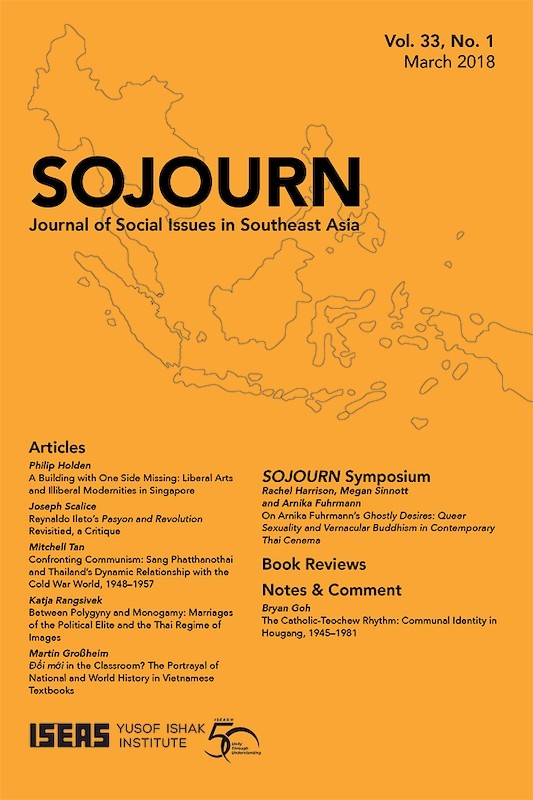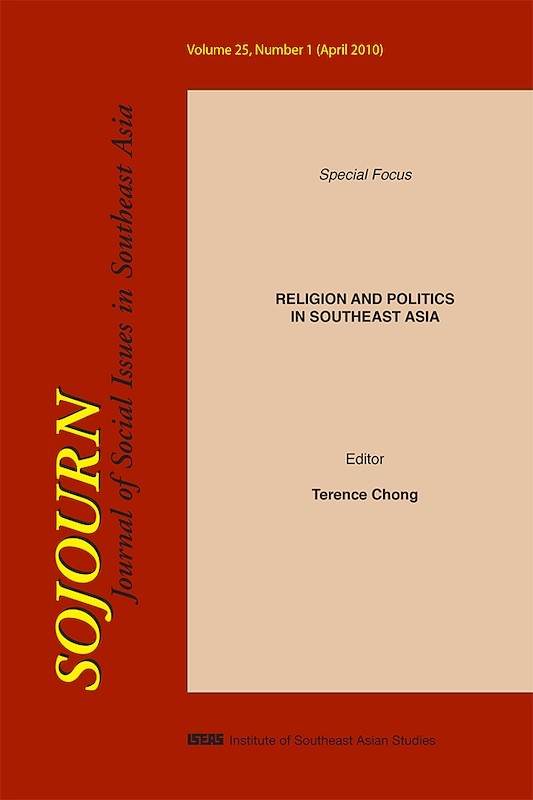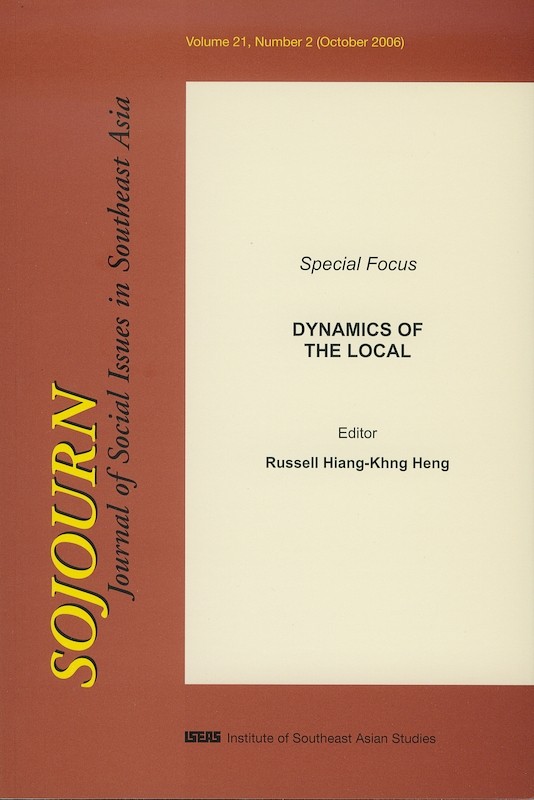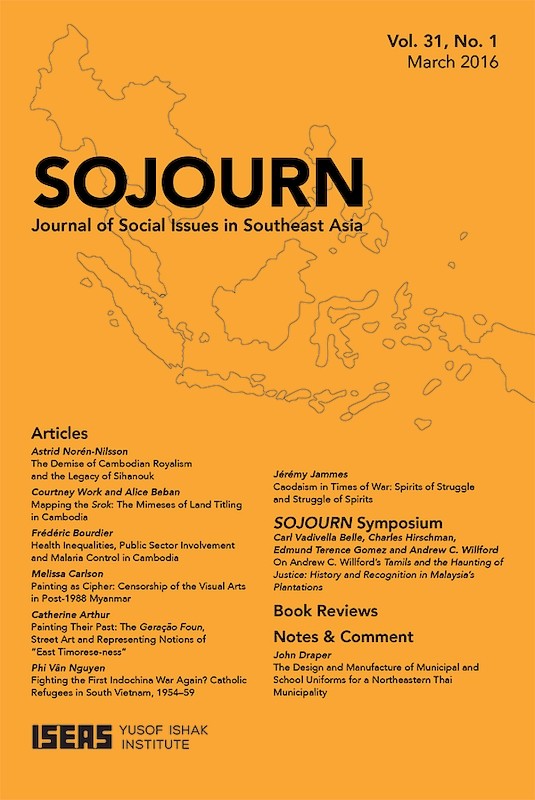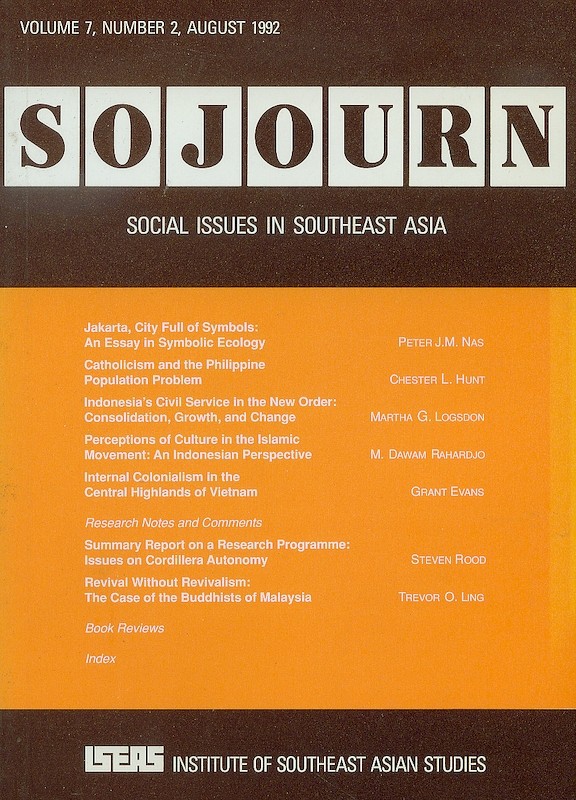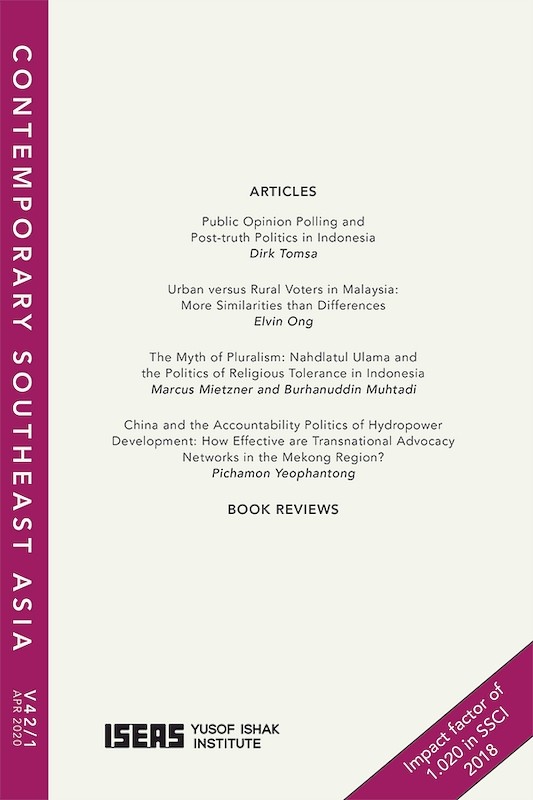SOJOURN: Journal of Social Issues in Southeast Asia Vol. 35/2 (July 2020)
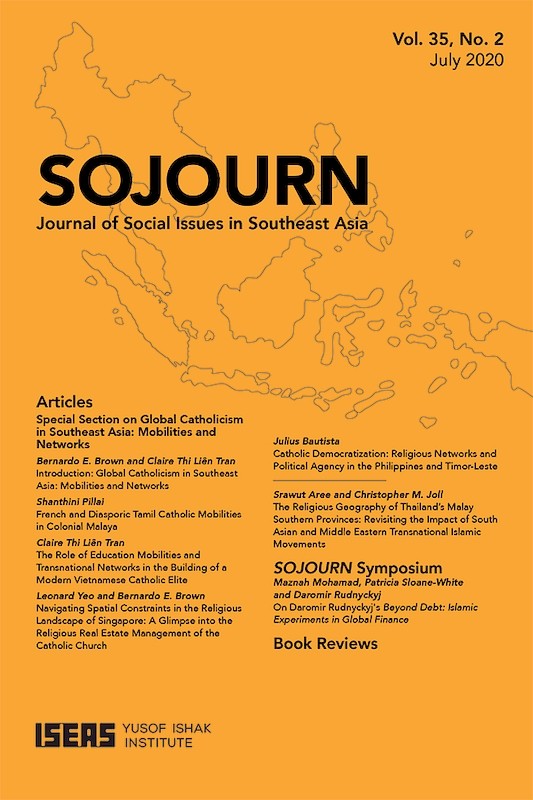
Su-Ann Oh, editor
Date of publication:
July 2020
Publisher:
ISEAS – Yusof Ishak Institute
Number of pages:
210
Code:
SJ35/2
Contents
-
SOJOURN: Journal of Social Issues in Southeast Asia Vol. 35/2 (July 2020)
[Whole Publication, ISSN: 17932858] -
Preliminary pages
- ARTICLES: SPECIAL SECTION ON GLOBAL CATHOLICISM IN SOUTHEAST ASIA: MOBILITIES AND NETWORKS
-
Introduction: Global Catholicism in Southeast Asia: Mobilities and Networks, by Bernardo E. Brown, Claire Thi Liên Tran, authors
-
French and Diasporic Tamil Catholic Mobilities in Colonial Malaya, by Shanthini Pillai, author see abstractThis paper explores religious mobilities within the Roman Catholic context by focusing on transformations to Tamil Catholic ontology in nineteenth-century colonial Malaya. It discusses samples from a French missionary memoir and correspondence between Tamil Catholics and French missionaries. It is concerned in particular with aspects of Tamil diasporic mobilities as they intersect with individual, communal and institutional structures and imaginaries. It also highlights the dialectics of changes in the hierarchical trajectories between missionary and convert as the French Catholic hierarchy encountered flows from various tributaries of Tamil Catholic individual imagination. The paper concludes that these and other everyday aspirations of the nineteenthcentury Tamil Catholic community traced in the memoirs and letters reveal various networks of religious mobilities that have affected modern-day Malaysian Tamil Catholic identity. They also provide crucial insight into the Asian regional networks of mobility that existed alongside the more established European missionary networks.
-
The Role of Education Mobilities and Transnational Networks in the Building of a Modern Vietnamese Catholic Elite, by Claire Thi Liên Tran, author see abstractThis paper focuses on the education mobilities and transnational networks in the Vietnamese Catholic Church between the 1920s and 1950s, a period characterized by the emergence of an independent national Church and the first Vietnamese bishops during colonial rule. While it is widely known that the Vatican and the Western missionaries had a role in the promotion of educational mobilities, Vietnamese actors promoted higher education not only for clerics but also for members of the laity by creating their own national and transnational networks. The particular case of the ‘Belgian connection’ offered a new generation of Vietnamese Catholics other places for education besides the dominant sites of Rome and France. The experience they gained through these independent education networks allowed this handful of the new Catholic elite to obtain knowledge in the social sciences and humanities. In addition, their experiences in Catholic Action saw them come to deal with powerful emerging transnational ideologies such as communism.
-
Navigating Spatial Constraints in the Religious Landscape of Singapore: A Glimpse into the Religious Real Estate Management of the Catholic Church, by Leonard Yeo, Bernardo E. Brown, authors see abstractThe state of Singapore is characterized by a persistent concern over land scarcity and efficient use of space. The Catholic Church shares these anxieties over space and is constantly rethinking strategies to manage its assets. These decisions require careful financial planning and the endless mobilization of material and human resources between different buildings in diverse locations. Examining how the authorities of the Church adapt its widely dispersed built infrastructure to the changing regulations for land distribution imposed by the state, this article reflects on how Catholicism has prioritized a policy of adaptation over one of resistance. We argue that the Catholic Church acts in pragmatic ways to retain an extensive network of institutions across the island as an effort to reflect the health and vibrancy of Catholicism in Singapore.
-
Catholic Democratization: Religious Networks and Political Agency in the Philippines and Timor-Leste, by Julius Bautista, author see abstractIn this article, I compare the Roman Catholic Church in the Philippines and in Timor-Leste in the 1980s and 1990s in discussing the extent to which transnational religious networks have been a factor in the capacity of the Church to advance a democratization agenda. Religious actors have influenced and shaped the structural and operational parameters of democratization in many parts of the world. Political theorist Samuel Huntington (1991) has observed that Roman Catholic religious teachings since the 1930s have corresponded to what has been described as the ‘Catholic wave’ of democratization. How can we situate the Philippines and Timor-Leste—the two most predominantly Roman Catholic countries in Asia—within this scholarship? What roles do religious networks play in community-based adaptation strategies, particularly in the context of nation-state formation in postcolonial and post-conflict situations? I pursue these questions by framing a comparative analysis around two thematic currents. The first explores the sociopolitical ramifications of the Roman Catholic Church as an inherently networked institution. I consider the notion of Catholicism as a global interconnection of clerical hierarchies that recognize pontifical authority as a personification of the unity of the Church. The second reconsiders the notion that the political interventions of the Church are tantamount to and coterminous with an endorsement of a particular form of political governance, in this case liberal democracy, as indicated in the ‘Catholic wave’ thesis. Instead of assuming that Church leaders homogeneously favour liberal democracy, I consider the emphasis by the Second Vatican Council on protecting the dignity of the human person, particularly that of the poor, and how this emphasis conditions the political agency of the Church in both countries.
- ARTICLES
-
The Religious Geography of Thailand’s Malay Southern Provinces: Revisiting the Impact of South Asian and Middle Eastern Transnational Islamic Movements, by Srawut Aree, Christopher M Joll, authors see abstractThis article describes changes in the ‘religious geography’ of Thailand’s Malay-dominated southern provinces of Pattani, Yala and Narathiwat since the 1960s. These have been led by a range of religious entrepreneurs returning to these parts of southern Thailand from the Middle East and South Asia. We begin by conceptualizing local Islamic diversity in ways that move beyond binaries such as the new and old schools <i>(kaum muda–kaum tua)</i> and accept that the vast majority of Malays in southern Thailand remain conservative, rural traditionalists. We provide relevant details about the background, overseas educational influences and the forms of religious activism pursued by leaders of local modernist, reformist and revivalist religious franchises. We also point out the different strategies pursued by these religious entrepreneurs and that the operational centres for many of these movements are located in Yala. This article argues that Middle Eastern influences in southern Thailand have been exaggerated, while South Asian influences have been overlooked, and that the Malaysian State of Kelantan has played an important role in diversifying the religious geography of these southern provinces.
- SOJOURN Symposium
-
On Beyond Debt: Islamic Experiments in Global Finance by Daromir Rudnyckyj, by Maznah Mohamad, Patricia Sloane-White, Daromir Rudnyckyj, authors
- BOOK REVIEWS
-
BOOK REVIEW: Malay Seals from the Islamic World of Southeast Asia: Content, Form, Context, Catalogue, by Annabel Teh Gallop, by Edwin P Wieringa, author
-
BOOK REVIEW: Southeast Asian Anthropologies: National Tradition and Transnational Practices, edited by Eric C. Thompson and Vineeta Sinha, by Robert Barnes, author
-
BOOK REVIEW: Aristocracy of Armed Talent: The Military Elite in Singapore, by Samuel Ling Wei Chan, by Muhammad Suhail bin Mohamed Yazid, author
-
BOOK REVIEW: Singapore’s Multiracialism: Evolving Diversity, by Chan Heng Chee and Sharon Siddique with Irna Nurlina Masron and Dominic Cooray, by John Clammer, author
-
BOOK REVIEW: Engaging Asia: Essays on Laos and Beyond in Honour of Martin Stuart-Fox, edited by Desley Goldston, by John F Hartmann, author
-
BOOK REVIEW: Minority Stages: Sino-Indonesian Performance and Public Display, by Josh Stenberg, by Henry Spiller, author
-
BOOK REVIEW: Electoral Dynamics in the Philippines: Money Politics, Patronage and Clientelism at the Grassroots, edited by Allen Hicken, Edward Aspinall and Meredith Weiss, by Patricio N Abinales, author
-
BOOK REVIEW: Identity, Equity and Social Justice in Asia Pacific Education, edited by Raqib Chowdhury and Lilly K. Yazdanpanah, by Cheng Yong Tan, author

